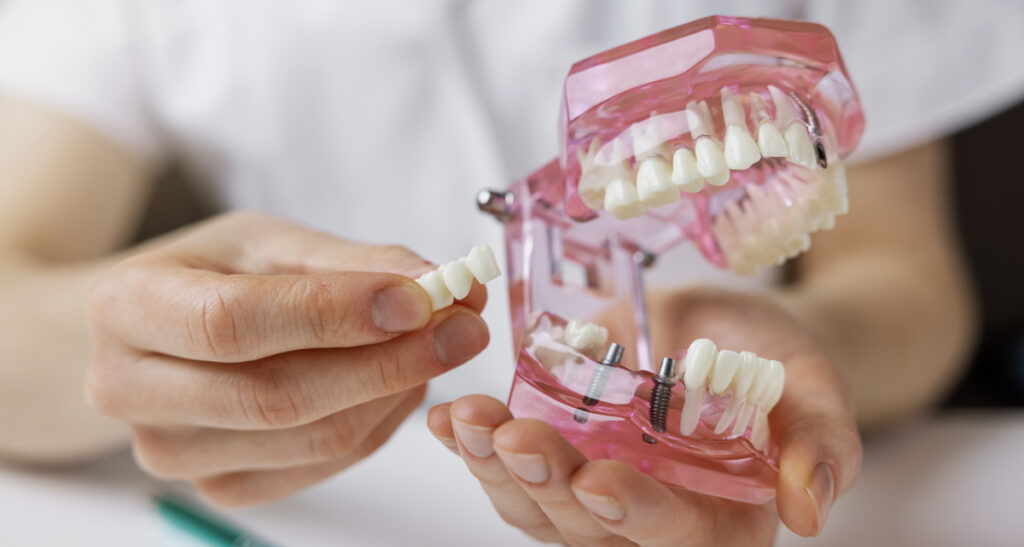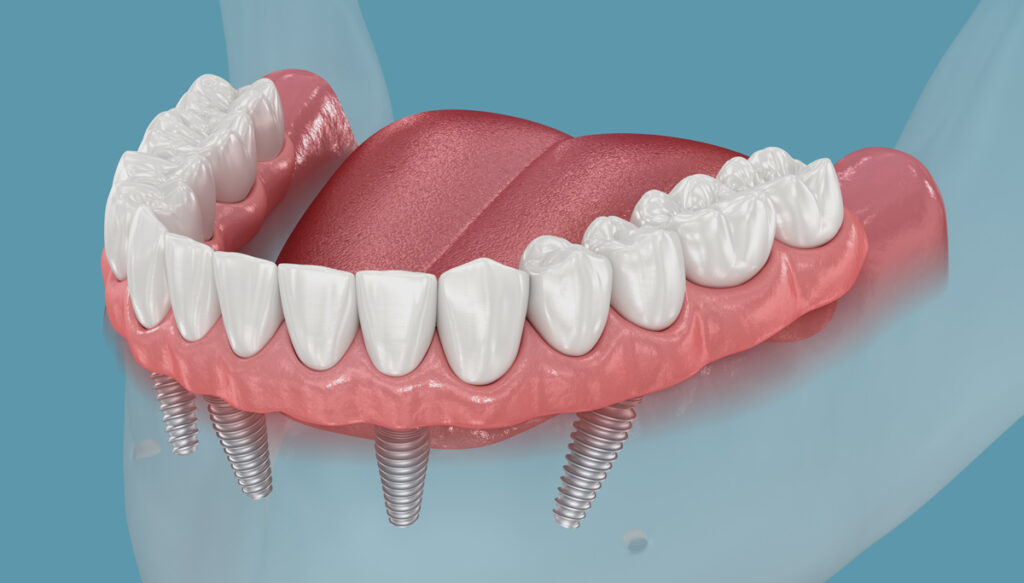Replacing missing teeth? Artificial teeth options to achieve a natural-looking smile

When you have teeth missing, it can affect far more than your ability to chew. Gaps in your smile can affect your speech, confidence, and long-term oral health.
Fortunately, there are many artificial teeth options available in the UK to replace missing teeth and restore a natural-looking smile. From dental implants to dentures and bridges, modern treatments are designed to mimic the appearance and function of natural teeth while also protecting surrounding teeth and gums.
Choosing the right tooth replacement option depends on your personal preferences, the condition of your mouth, and guidance from your dentist.
Understanding the impact of missing teeth
Effects on oral health
Tooth loss can cause more than a visible gap left in your smile. Missing teeth may lead to bone loss in the jawbone, changes in facial structure, and difficulties maintaining better oral hygiene.
When teeth are missing, surrounding teeth often shift into the empty space, which can cause bite issues and increase the risk of decay or gum disease.
Effects on confidence and everyday life
Many people with missing teeth feel self-conscious when talking or smiling. Eating can also become challenging, particularly if several teeth are missing from the upper and lower teeth.
Replacing teeth with artificial teeth options can restore confidence while allowing you to enjoy a full range of foods comfortably.

Factors to consider before choosing an option
Number and location of missing teeth
The best treatment option depends on whether you have one tooth missing, several teeth missing, or an entire arch of teeth to replace.
For example, a single dental implant can effectively replace one tooth, whereas complete dentures may be more suitable for total tooth loss.
Oral health condition and bone strength
Healthy gums, bone, and remaining teeth play a major role in choosing suitable treatment. Dental implants require a strong jawbone to support them, as implants stimulate the bone and help prevent further bone loss.
If bone is insufficient, other solutions like bridges or removable dentures may be recommended.
Dental implants
What are dental implants?
Dental implants are considered one of the most effective long-term solutions for tooth replacement. An implant is a small titanium or sometimes precious metal post that is surgically placed into the jawbone.
Over time, the bone fuses to the implant, creating a strong base for dental crowns or bridges. Because implants stimulate the jawbone, they help maintain facial structure and prevent further deterioration.
Benefits and potential limitations
Implants provide a natural-looking result and function much like natural teeth. They allow you to eat, speak, and smile with confidence.
However, they require a healthy jawbone and good gums, and the treatment may take several months from start to final crown placement. Same-day implants are available in some cases, but not everyone is suitable.
Costs may be higher than other tooth replacement options, but the long-term oral health benefits often outweigh this consideration.

Dental bridges
Types of dental bridges available
A dental bridge consists of an artificial tooth anchored by crowns on adjacent natural teeth or sometimes supported by implants. The most common type is the traditional bridge, which relies on surrounding teeth for support.
Cantilever and Maryland bridges are alternatives that use different methods of attachment, depending on the location of the gap left.
Advantages and considerations
Bridges provide a secure and natural-looking solution, especially when only one or two teeth are missing. They are less invasive than implants but may require the filing down of adjacent teeth to support the crowns.
This can affect otherwise healthy teeth, so your dentist will carefully evaluate whether this treatment option is suitable.
Dentures
Complete dentures for full tooth loss
Conventional dentures are made after the gums have healed following extractions, while immediate dentures are placed straight after teeth are removed, allowing you to leave the dentist with teeth the same day.
Partial dentures for multiple missing teeth
Partial dentures are designed for patients who still have some remaining teeth. These removable appliances use clasps to attach to surrounding teeth and fill gaps left by missing teeth.
Partial dentures are often custom-made for comfort and to blend in with natural teeth.

Implant-supported dentures
How implant-supported dentures work
Unlike traditional removable dentures, implant-supported dentures are secured to implants placed in the jaw. This provides a more stable fit, reducing issues with slipping or discomfort when eating and speaking.
Benefits compared to traditional dentures
Implant-supported dentures, sometimes called snap-in dentures, help prevent bone loss as implants stimulate the jawbone. They feel more secure than conventional dentures and may offer a better long-term solution for patients replacing an entire arch of teeth.
However, they involve more complex treatment and higher costs than removable dentures.
Alternative and emerging solutions
Temporary tooth replacement options
For patients awaiting final denture fitting or implants, a temporary denture can provide a practical solution. These removable appliances maintain appearance and oral function until the final denture or permanent treatment is ready.
Some patients may need to wear dentures overnight during transitional stages, though this should be discussed with a dentist for proper care.
Advances in dental technology in the UK
Modern materials such as porcelain and advanced custom-made dental crowns have improved the appearance of artificial teeth. These innovations mean false teeth today look more natural than traditional dentures of the past.
Digital scanning and 3D printing are also playing a role in improving the fit and comfort of tooth replacement options.

Choosing the right solution for you
Consulting with your dentist
Selecting from the main alternatives, such as dental implants, bridges, or dentures, depends on individual factors.
A dentist will examine your gums, jaw, and remaining teeth, and advise on the treatment options that best match your dental health, personal preferences, and budget.
Cost, maintenance, and lifestyle considerations
While implants may be the long-term solution for many, others may prefer bridges or removable dentures as a more affordable treatment. Each option requires proper care to maintain oral health.
For example, removable dentures need cleaning daily, and bridges require careful cleaning around the adjacent teeth. Implants and crowns also need regular check-ups to ensure long-term oral health.
The best choice for you is the option that restores function, protects healthy teeth, and gives you a smile that feels both comfortable and natural-looking.
Come to Fulham Road Dental for tooth replacement solutions done right
At Fulham Road Dental, we understand that replacing missing teeth is more than just a cosmetic concern: it’s about restoring your confidence, comfort, and long-term oral health. Our team is here to guide you through every step of the process. We take the time to assess your unique needs, explain all available treatment options, and develop a personalised plan that aligns with your goals and lifestyle.
We offer a range of tooth replacement options, from immediate dentures for same-day solutions to implant-supported dentures that provide enhanced stability and function. Our experienced team is committed to delivering results that not only look natural but also support your overall oral health.
If you’re ready to explore your options for replacing missing teeth, we invite you to schedule a consultation with us. At Fulham Road Dental, we are dedicated to helping you achieve a smile that feels as good as it looks. Contact us today to begin your journey toward a healthier, more confident you.
FAQs
Which option is best for replacing multiple missing teeth?
The best option depends on your mouth and personal preferences. Dental implants are often considered the long-term solution because they are fixed in the jaw and help prevent bone loss. Implant-supported bridges or dentures can replace multiple missing teeth at once, providing stability and a natural-looking result.
For those who prefer a less invasive or more affordable solution, partial dentures or conventional removable dentures are suitable alternatives. Your dentist can assess your oral health, remaining teeth, and jawbone to recommend the option that is safest and most comfortable for you.
How natural do artificial teeth look and feel?
Artificial teeth today are designed to look and feel very much like natural teeth. Advances in materials such as porcelain and high-quality acrylic allow crowns, bridges, and dentures to match the colour, shape, and translucency of your remaining teeth. Custom artificial teeth fit your mouth perfectly, helping them blend with natural teeth.
Dental implants, bridges, and well-fitted dentures allow you to bite and chew comfortably. Implant-supported options feel especially close to natural teeth because they are securely anchored in the jaw. With proper care, artificial teeth provide a functional, comfortable, and natural solution for tooth replacement.
Can artificial teeth crack or break?
Yes, artificial teeth can crack or break, although this is not very common with modern materials. Porcelain and high-quality acrylic used in crowns, bridges, and dentures are strong, but they can be damaged by biting very hard foods, accidental impacts, or grinding your teeth. Regular check-ups with your dentist help spot any issues early and keep your artificial teeth in good condition.
If a tooth does crack or break, it is usually possible to repair or replace it. Implant-supported teeth and well-made dentures are more durable, but proper care and avoiding excessive force are important to protect them.
Will I need dental treatment before getting artificial teeth?
Some people may require dental treatment before getting artificial teeth. This may include removing decayed or damaged teeth, treating gum disease, or repairing surrounding teeth. Your dentist will check your jawbone and gums to ensure they are healthy enough to support implants, bridges, or dentures.
Sometimes additional procedures, such as bone grafting, are needed to strengthen the jaw. This helps ensure your artificial teeth fit securely and last longer. Completing necessary treatment first also improves long-term oral health and the overall success of your tooth replacement, giving you a natural-looking and comfortable smile.
Can artificial teeth replace just one tooth?
Yes, artificial teeth can replace just one tooth. A single missing tooth can be replaced using a dental implant, which is a small post placed in the jawbone to support a crown. This solution feels and functions like a natural tooth and does not affect surrounding teeth.
Another option is a dental bridge, where the gap is filled by an artificial tooth supported by crowns on the adjacent natural teeth. Your dentist will check your oral health, gums, and remaining teeth to recommend the best option. Both implants and bridges can provide a natural, long-lasting solution for one missing tooth.
Does smoking affect artificial teeth?
Smoking can affect artificial teeth. It can stain dentures, crowns, and bridges, making them look less natural over time. Smoking also increases the risk of gum disease and slows healing, which can affect dental implants and other treatments that rely on healthy gums and bone.
For implant-supported teeth, smoking may reduce the success rate because implants need strong bone and healthy gums to stay secure. Dentists recommend quitting or reducing smoking before and after treatment. With proper care and regular check-ups, artificial teeth can last longer, but avoiding smoking helps maintain both their appearance and your overall oral health.
Which type of artificial teeth will be best for me?
The best type of artificial teeth for you depends on several factors, including how many teeth are missing, the health of your gums and jawbone, and your personal preferences. Dental implants, bridges, and dentures all have different benefits and are suitable for different situations.
Your dentist will assess your oral health, remaining teeth, and jaw to recommend the most suitable option. Implants provide a long-term solution that feels like natural teeth, while removable dentures or bridges may be easier or quicker to fit. Choosing the right option ensures comfort, an aesthetically pleasing smile, and better oral health for the future.
Can my natural teeth become damaged under artificial teeth?
Natural teeth can sometimes become damaged under artificial teeth, particularly if the fit is not perfect. Dental bridges that rely on adjacent teeth for support can place extra pressure on healthy teeth, leading to wear, cracks, or decay. Poorly fitting removable dentures can rub against gums and remaining teeth, causing soreness, misalignment, or even loosening of surrounding teeth over time.
Other problems can include increased risk of cavities if food becomes trapped around the supporting teeth, or gum irritation that can affect oral health. Regular check-ups and proper care are essential to prevent these issues and protect healthy teeth.
Will I be able to eat normally with artificial teeth?
Yes, most artificial teeth allow you to eat normally once you are used to them. Dental implants, bridges, and well-fitted dentures restore chewing function, making it easier to eat a wide range of foods. Implant-supported teeth feel very similar to natural teeth and provide strong bite support.
When first getting dentures or a dental bridge, it may take a few weeks to adjust. Cutting food into smaller pieces and chewing slowly can help. Over time, with practice and proper care, you should be able to eat comfortably and enjoy most foods without pain or difficulty.
Can I use insurance to pay for artificial teeth?
Some dental insurance plans in the UK may help cover artificial teeth, but there are often exclusions. Cosmetic or elective treatments are usually not covered, meaning procedures done purely to improve appearance may need to be paid privately. Implants, in particular, are rarely covered and are generally reserved for extreme medical needs, such as reconstructive treatment after trauma or significant tooth loss affecting oral health.
Partial or complete dentures and bridges may be partially covered, depending on your plan. It is important to discuss your options with both your dentist and insurance provider to understand what is included, any limits, and the likely out-of-pocket costs.